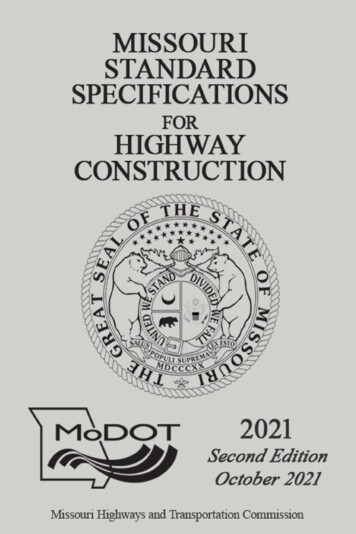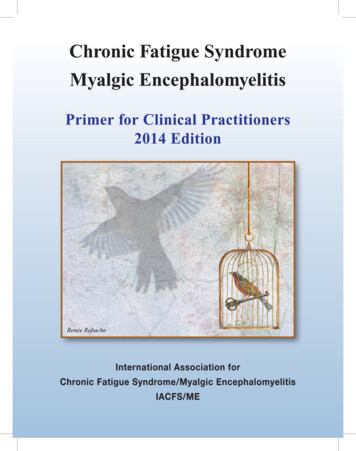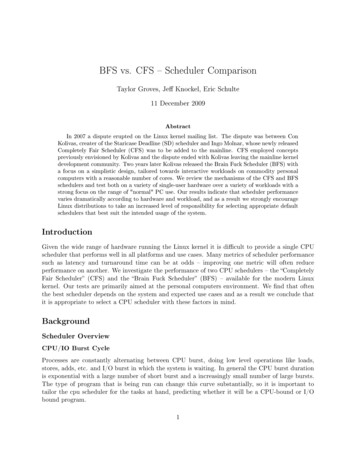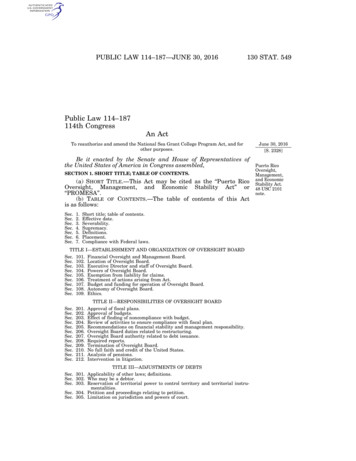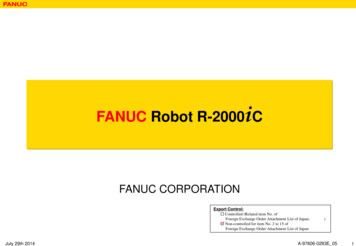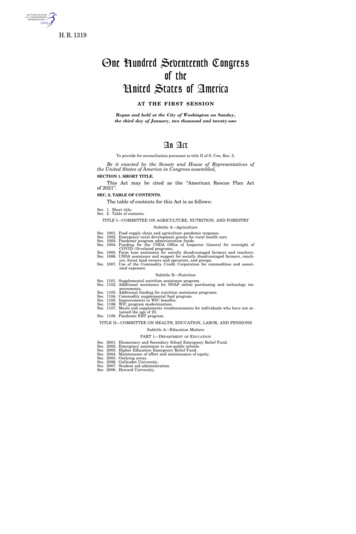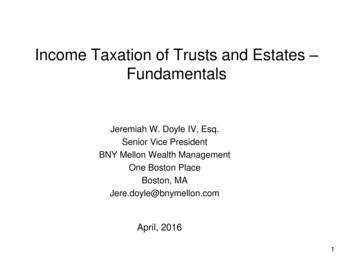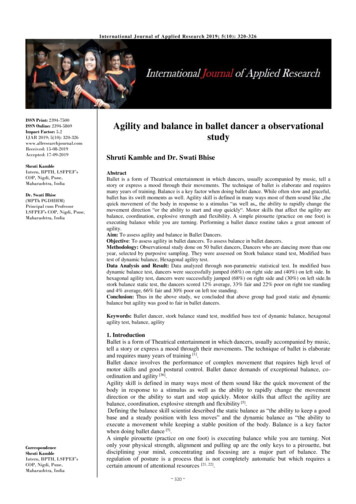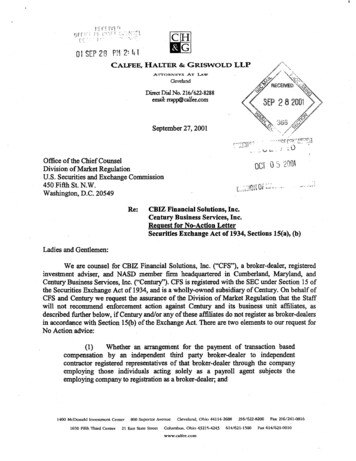
Transcription
CALFEE,HALTER& GRISWOLDLLPA ' i T R N E Y S A1 LAWClevelandDirect Did NO.216/622-8288emaik rrap@cal ee.comSeptember 27,2001--"P.frirOffice of the Chief CounselDivision of Market RegulationU.S. Securities and Exchange Commission450 Fifth St. N.W.Csi* a * Washington,D.C.20549Re:CBIZ Financial Solutions, Inc.Century Business Services, Inc.Request for No-Action LetterSecurities Exchange Act of 1934, Sections 15(a), @)Ladies and Gentlemen:We are counsel for CBIZ Financial Solutions, Inc. ("CFS"), a broker-dealer, regkteredinvestment adviser, and NASD member firm headquartered in Cumberland, Maryland, andCentury Business Services, Inc. ("Century"). CFS is registered with the SEC under Section 15 ofthe Securities Exchange Act of 1934, and is a wholly-owned subsidiary of Century. On behalf ofCFS and Century we request the assurance of the Division of Market Regulation that the Staffwill not recommend enforcement action against Century and its business Unit affiliates, asdescribed further below, if Century and/or any of these affiliates do not register as broker-dealersin accordance with Section 15@) of the Exchange Act. There are two elements to OUT request forNo Action advice:Whether an arrangement for the payment of transaction based(1)compensation by an independent third party broker-dealer to independentcontractor registered representatives of that broker-dealer through the companyemploying those individuals acting solely as a payroll agent subjects theemploying company to registration as a broker-dealer; and1400 McDonald Investment Center1650 Fifth 'rhid Center80 Superior Avenue21 k s t Stafe StreetCleveland, Ohio 441 14-2688Colurnhus, Ohio 4J2154243www.calfcc.com216/622-8200614/621-1500Fax 216/24I-oHtbFax 614/621-(K110
cCALFEE,HALTER& GRISWOLDLLPOffice of the Chief CounselDivision of Market RegulationSeptember 26,2001Page 2wheulkr an arrangement involving CFS and the independent(2)registered broker-dealer firm, whereby commission revenues net of payments toregistered representatives who are employed by CFS affiliates are split betweenthe two broker-dealers, with the revenue received by CFS ultimately contributingto earnings and profits of CFS that are distributed as dividends to Century, itsparent company, and thereafter, as part of revenues fkom all operations, byCentury through business Units and compensation of employees in the normalc o m e of its entire business, subjects Century or any Century business unit toregistration as a broker-dealer(&’THE OPERATIVE FACTSCentury is a leading provider of outsourced business services to d l and medium-sizedcompanies in areas including accounting and tax, employee benefits, wealth management,property and casualty insurance, payroll, information systems consulting, and human resourceconsulting to clients through a network of professional business units, or operating companies,including accounting finns. As a broker-dealer subsidiary of Century, CFS provides financialplanning and investment advisory services as well as securities brokerage for clients of Century’snetwork of business units.As a result of a strategic alliance previously entered into between Century and anindependent third-party broker-dealer registered under the Exchange Act and which is an NASDmember firm, Century business units currently employ approximately thirty (30) individuals whoare licensed, trained, and directly supervised in securities sales activities and compensated for thesales of securities as independent contractor registered representatives of the third-party brokerdealer. These individuals are not registered representatives of, or employed by, CFS. Theirsecurities activities are, under the terms of an agreement between the third-party broker-dealerand Century, entirely supervised and controlled by the third-party broker-dealer, which hasassumed 111 responsibility for the securities activities of the individuals. However, theseindividuals render professional and other services not related to the sale of securities throughtheir respective employing Century business units, and are Compensated by Century or itsbusiness units in their employment unrelated to the sale of securities.In order to maximize administrative efficiencies, to provide for withholding ofappropriate funds for purposes of federal, state and local income taxes, and to assure theeligibfity and maximum access of Century business unit employees to employment benefitprograms that are tied to a compensation base, Century has determined that transaction based
CALFEE,HALTER& GRISWOLDLLPOfficeof the Chief CounselDivision of Market RegulationSeptember 26,2001Page 3compensation from the sale of securities by employees of tbe Century business units will be paidby the third-party broker-dealer to the individual registered representatives through the particularCentury business unit at which the individual is employed That business unit will act solely as apayroll agent for purposes of W-2 reporting of the income. To effectuate this mechanism, eachindividual involved has entered (or will enter) into an agreement providing for the assignment of100% of the individual's transaction-based compensation from the third-party broker-dealer tothe appropriate employing Century business unit, which unit, as payroll agent, will then pay tothe individual as IRS W-2 reported income the net amount after withholding and deductioiw.'The employing Unit will have no rights to any of the funds paid by the third-party broker-dealerto the affected individuals.The balance of gross commission revenue fiom sales of securities by individualsemployed by Century business units will be split between the third-party broker-dealer and CFSpursuant to the terms of an agreement that is part of the strategic alliance between Century andthat third-party firm. CFS, like any broker-dealer subsidiary, will distribute profits fi-om allaspects of its business by way of dividends to its parent, Century, in the normal course ofbusiness. CFS does not retain earnings and profits, and thus any dividends to its parent ultimatelyinclude profits, if any, attributable to the receipt of commission revenues from the third-partybroker-dealer. It is also the case that ultimately Century compensates employees of its businessunits. The distribution of compensation throughout Century business units is determined in parton the basis of overall productivity of a unit and its contribution to the overall success ofCentury.Neither Century, CFS, nor any of the Century business units that employ individuals whoare also registered representatives of the third-party broker-dealer, exercises or has the power toexercise any control or supervision over the securities sales activities of those individuals. To thecontrary, by agreement with the third-party broker-dealer, that firm has full responsibility forsupervision and control ia the conduct of securities business. The individuals are not duallylicensed with or through CFS,and the fact that all securities are offered through the third-partybroker-dealer is fbUy disclosed in accordance with applicable NASD requirements. Locations atwhich the individuals conduct securities sales activities are identifled and registered by the thirdparty broker-dealer as branch offices to the extent required by NASD rules and any applicablestate laws. Century and its business Units employing these individuals, and other employees, are'The rote of each Century business unit in this process is ministerial. Records kept with respect to commissionpayments will be properly reflected on the books and records of the third-party broker-dealer maintained by thatfirm, and will be available for inspection by the SEC and NASDR
CALFEE,HALTER& GRISWOLDLLPOffice of the Chief CounselDivision of Market RegulationSeptember 26,2001Page 4not involved in any capacity in the securities transactions effected by these individuals throughthe third-party broker-dealer.REGULATORY/LEGAL ANALYSISOn the foregoing facts it is our opinion that neither the individual Century business unitsemploying the individuals who are independent contractor registered representatives of the thirdparty broker-dealer, nor Century itself, would be required to be registered under the ExchangeAct as a broker-dealer@). Our conclusion is based upon various No Action Letters and principlesdiscussed below. In all of this we have particularly considered the S t a f f s partial denial of the NoAction Request in 1st Global. Inc. (Available May 7,2001).A. As to the first element of our request, based on a series of No Action Letters includingMoran Asset Management, Inc. (Available June 29, 1988); Time Insurance Co., (AvaiIable Oct.17, 1989); National Pension Administrators, Inc. (Available Oct. 19, 1985); and most recentlyEPLXHoZdings COT. (Available Apr. 2,2001), we have concluded that simply by receiving anddisbursing transaction-based compensation paid by the third-party broker-dealer to independentcontractor registered representatives, Century business wits that employ those individuals wouldnot be deemed to be broker-dealers. The Century business units have no role in the conduct ofsecurities activities by these individuals, and the mechanism for payment through the unit neitherdirectly nor indirectly involves any control over those activities. All supervision, control andtrainhg responsibility contemplated by section 15@)(4)@) of the Exchange Act is assumed bythe third-party broker-dealer and its principals, with which these individuals are associatedpersons as defined in section 3(a)( 18) of the Act?The cited No Action Letters all make clear that a "payroll agency" function, the objectiveof which is to facilitate the orderly disbursement of commissions, provide for withholdkg ofappropriate sums for taxes, and to emure qualification for employee benefit programs, will notresult in the intermediate entity being deemed to be a brokerdealer. Time Insurance Co., supra,is particularly instructive on this point. In fime, the Staff approved the mechanism fordisbursement of commissions from the broker-dealer to registered representatives through therepresentatives' employer, which acted functionally as a payroll agent for reasons thatspecifically included the determination of an employee's compensation base for f i g e benefits.See also Tramamerica Insurance Securitim Sales Corp. (Available §ept. 9, 1987) (Eirokerdealq to train,supervise and control registered persons that sell insurance securities products as part of doing business asincorporated general insurance agents and insurance brokers).
CALFEE,HALTER& GRISWOLDLLPOffice of the Chief CounselDivision of Market RegulationSeptember 26,2001Page 5Here, each of the Century business units that will receive payments from the third-partybroker-dealer fur disbursement to the af ected individuals will perform only the function ofcollection and distribution of commissions that are due and payable on account of transactionsthat have been completed through that third-party firm.We note too that the business units willserve only as a conduit for commissions, and that all commissions (net of Withholding and anydeductions) will be passed on directly for the benefit of individuals who are registeredrepresentatives of the third-party brokerdealer. In this, we believe that any concern addressed in1st Global, Inc. is eliminated, as all of transaction-based compensation due individuals will’bepaid to that individual. There is no retention, and the business units will have no discretion indetermining the amount of payments. The level of commission pay-outs by the third-partybroker-dealer to all registered representatives involved here is fked as a matter of the contractbetween Century and the third-party firm. Century has no other involvement or authority indetermining compensation paid by the third-party broker-dealer to registered representatives, andhas no involvement in any securities activities that generate the compensation.B. The second element of our request focuses on the relationship among CFS,the thirdparty broker-dealer, and Century itself. As described above, Century and the third-party brokerdealer are involved in a strategic alliance which, among other things, obligates the third-partyfirm to pay 85% of gross commissions from sales of securities by individuals employed byCentury business units (less payouts due individual registered representatives under thearrangement described in Part A above) to CFS. We are of the opinion that as a registeredbroker-dealer and NASD member h,CFS may properly be paid a portion of the transactionbased compensation generated through the third-party brokerdealer as a result of securitiesactivities of those registered representatives who are also employed by Century business Units. Itis our M e r opinion that the ultimate receipt of revenue &om CFS by its parent company,Century, would not render Century subject to broker-deder registration. Similarly, we do notbelieve that the ultimate distribution by Century of revenue and compensation to its businessunits and employees would subject those business units to registration requirements simplybecause revenues eventually distributed throughout the corporate family include in somemeasure what is traceable to commissions received by CFS,and indeed, ultimately to securitiesactivities of business unit employees who are registered representatives of the third party brokerdealer. The corporate relationship between CFS and Century, and between Century and itsbusiness units, coupled with the fact that both Century and its other business units and employeesultimately share in revenues that include the net profits derived fiom all operations led us toassess whether, simply by reason of ultimately receiving such revenues, either Century or its
CALFEE,HALTER& GRISWOLDLLPOffice of the Chief CounselDivision of Market RegulationSeptember 26,2001Page 6individual business units would be deemed to be a brokerdealer@). We made this assessment inthe light of the most recent partial denial of No Action Advice in 1st Global, Inc., in which theStaff, citing to the Birchtree line of No Action Letters: concluded that receipt of transactionbased compensation related to securities transactions is a “key factor” that may require an entityto register as a broker-dealer. The Staff also spoke in 1st Global, Inc. concerning the fact that anunregistered entity might exercise such a degree of control over the activities of a broker-dealeror its registered representatives that registration by the entity would be required.The scope of the broker-dealer registration requirements under the Exchange Act dustalways be defined in terms of the objective of regulation. Extending the scope of broker-dealerregulation to those persons or entities who are positioned to direct or influence a registeredrepresentative’s securities activities is consistent with the objective of assuring adherence tocustomer protection standards by those who directly interact with investors and are in actualintermediary roles, We are certain, however, that a line may, and should, fairly be drawnbetween the “salesman’s stake” in a securities transaction that the Staff spoke of in 1st Global,Inc. and the corporate family affiliations that involve revenue flowing through those entities.In the circumstances presented here, the registered broker subsidiary of Century receivesrevenue attributable to securities activities of registered representatives of the third-party brokerdealer, who are in all aspects of theb securities activities controlled, trained and supervised bythat third-party h.To the extent those revenues contribute to earnings and profits for CFS theyare ultimately transferred to Century, as in any parent and wholly-owned brokerage subsidiarysetting. Century does not control, and has no power to control, those individuals who areregistered representatives of the third-party broker-dealer in the conduct of their securitiesactivities. Its ultimate stake is in the overall success in the operations of dl of its business units.When Century, in tum,determines to distribute revenues through compensation to employees inbusiness units it likewise does so based in part on the successful overall operations of a unit, butno business Unit has the power to control or direct the securities activities of any employee whoBirchtree Financial Servicar, Inc. (Available Sept. 22, 1998). Birchtree focused on the routing of commissions ortransaction-based compensation directly from a broker-deder to an unregisteredentity estabIished and controlled bythe registered representative. Tbat is not the situation presented here, as all ConnniSsions are paid either to theregistered representative through W e r employer as payroll agent, or to CFS, a remered broker-dealer.
CALFEE,HALTER& GRISWOLDLLPOffice of the Chief CounselDivision of Market RegulationSeptember 26,2001Page 7is also a registered representative of the third-party broker-dealer, and who is compensated bythat third-party firm for the sales of securities through the mechanism described in Part A above.4In preparing this request we have reviewed numerous prior No Action Letters andrequests, and have found no instance in which the Staff has concluded that the kind of ultimateeconomic stake traceable to securities activities that is presented by either brokerage subsidiaryaffiliations or third party brokerage affiliations presented here requires registration by the parentcompany or the non-broker alliance affiliate. To the contrary, in considering networking k dother arrangements between independent broker-dealers and which involve employees of oneentity being registered representatives of mother for purposes of conducting securities activities,the Staff has focused on the fact that all personnel involved in securities activities will be Wlysubject to regulatory requirements and the applicable rules of self-regulatory organizations, see,e.g., Somerset Group (Available Dec. 20, 1996). In addition, the Staff has determined that themere “presence” of transaction-related compensation in arrangements with an unregistered entitywill not give rise to the necessity of broker-dealer registration, see, eg., MerriZZ Lynch, Pierce,Fenner & Smith,Inc. (Available July 9, 1987) (Broker-dealer compensation of a f i t y groupsbased on transaction-related revenues).Similarly, we have discovered no instance in which ultimate determinations by a parentorganization to distribute revenues among business units or compensate employees generally hasbeen viewed as presenting any degree of control over the securities activities of registeredrepresentatives who by contract are controlled and directed in those activities by a registeredbroker-dealer. Today, in the era of third party brokerage affiliations, we are even more certainthat the relationships here involve no control over securities activities as envisioned in 1st GZobuZInc., and no receipt of transaction-based compensation by a non-registered entity in any degreeor manner that would trigger broker-dealer registration requkements.4In Retirement System Disnibutors, Inc. (Available Feb. 7, 1992), the staff favorably reviewed an affinity andnetworking arrangement that operated as a functional analog of what is presented here. In one element of RetirementS’iemDirtributurs “joint employees” of financial institutions or participating associations and a broker-dealerengaged in securities activities as well BS other employment activity. The Secutites activities were conductedentirely under the control and supervision of the broker-dealer. While the circumstances in Retirement SystemsDiSLributors were more complex than those presented here, the point that a registered broker-dealer controlled,supervised and was responsible for all securities-related activities of the “joint employees” was centraI in theanalysis.That is critical here as well.
,CALFEE,HALTER& CRISWOLDLLPOffice of the Chief CounselDivision of Market RegulationSeptember 26,2001Page 8CONCLUSIONOn the foregoing analysis, we respectfully request the Staff to advise us that it will notrecommend any enforcement action to the Commission if CFS,Century and Centwy's businessunits proceed with arrangements described above, under which commissions and any othertransaction-related compensation is paid by the third-party broker-dealer to registeredrepresentatives through their respective Century business unit employers, and Century ultimatelyreceives earnings and profits from its brokerage subsidiary and distributes revenues 'andcompensation to business units and employees, without Century andor its various business Unitsother than CFS registering as broker-dealm. Please d l if you have any questions or require anyfurlher information. As business strategies and plans are directly impacted by yourdetermination, we ask that consideration of this request be expedited to the extent possible.Thank you for your consideration.very truly yours,Ad-Robert N. Rappcc:Mr. Chris MathewsNancy M. Mellard, Esq.-
Re: CBIZ Financial Solutions, Inc. Century Business Services, Inc. Request for No-Action Letter Securities Exchange Act of 1934, Sections 15(a), @) Ladies and Gentlemen: We are counsel for CBIZ Financial Solutions, Inc. ("CFS"), a broker-dealer, regktered investment adviser, and NASD member firm headquartered in Cumberland, Maryland, and
